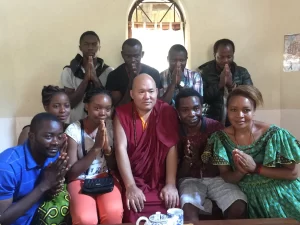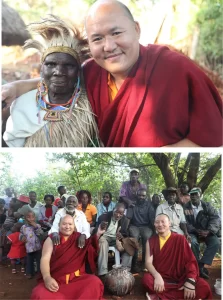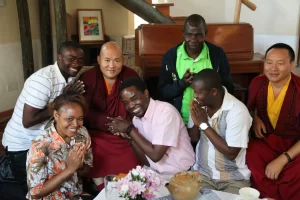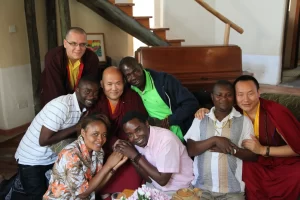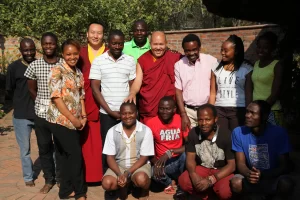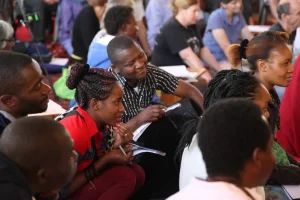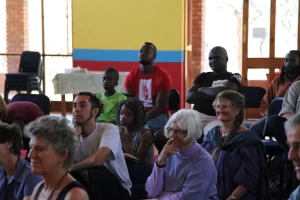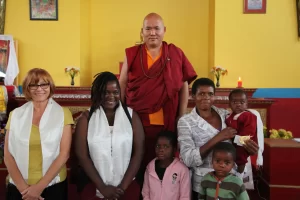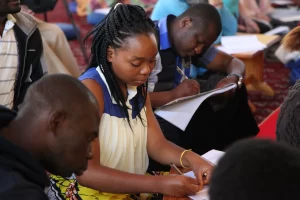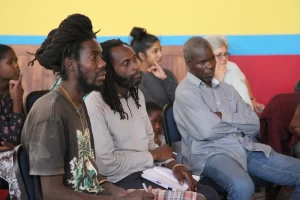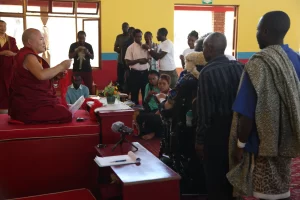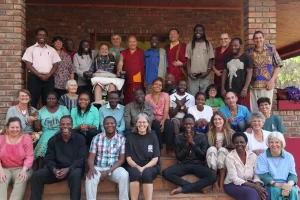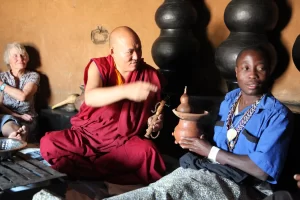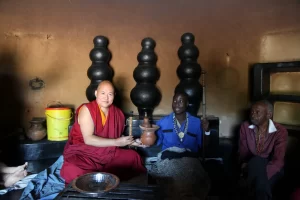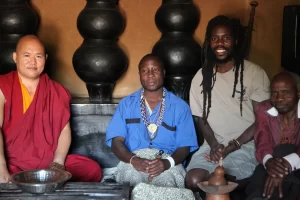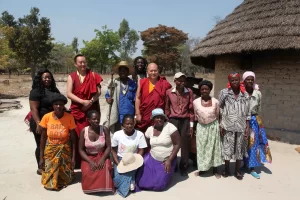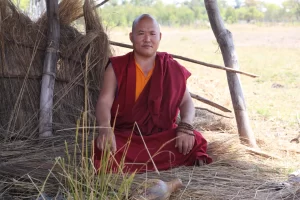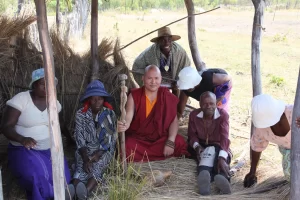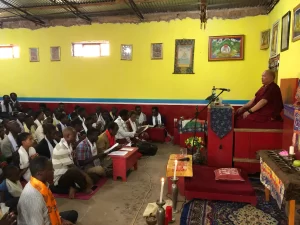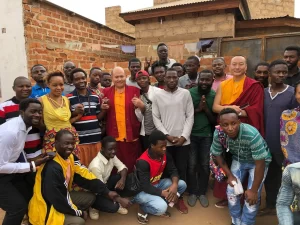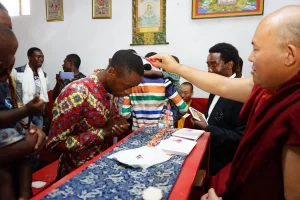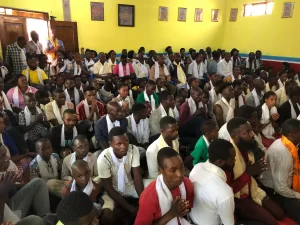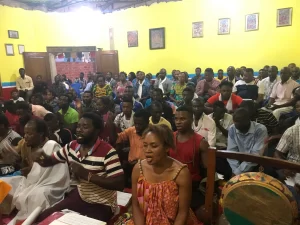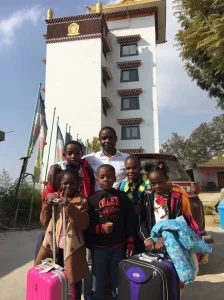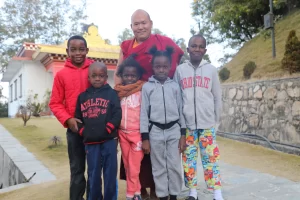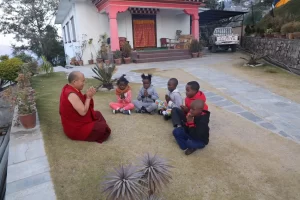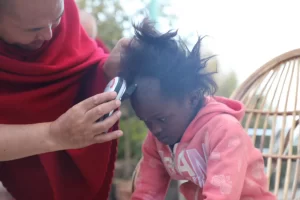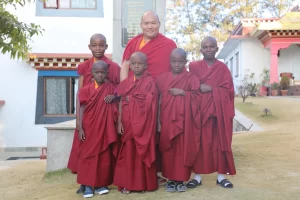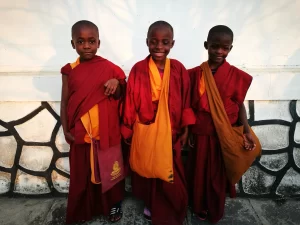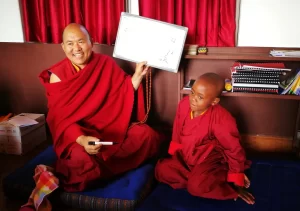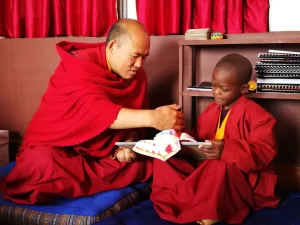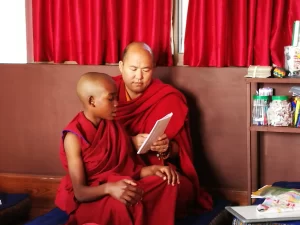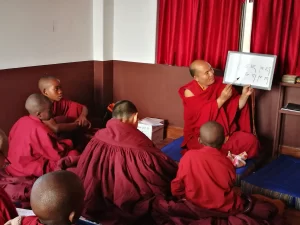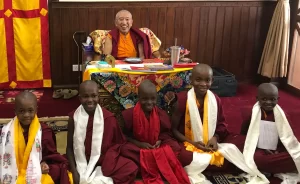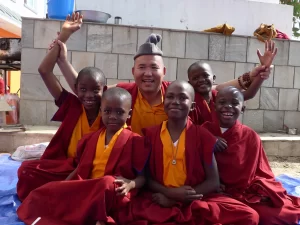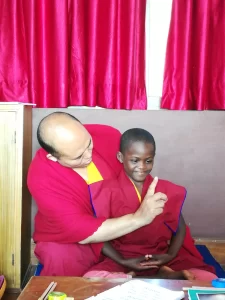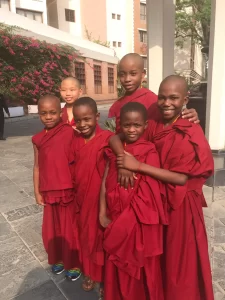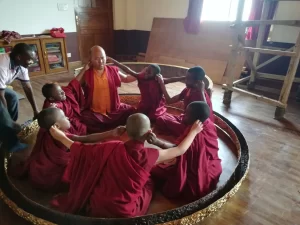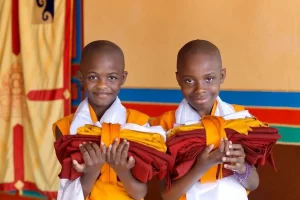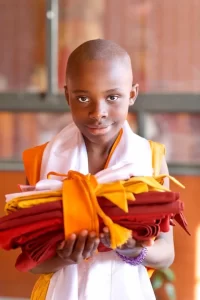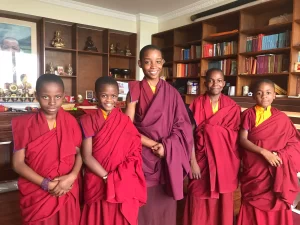RFA interview about Buddhism in Africa
RFA interviewed Drupon Khen Rinpoche Karma Lhabu about his role in bringing Buddhism to Africa, and especially to the indigenous people of the Congo. This connection can be traced back to Akong Rinpoche’s first visit to South Africa in 1982. The interest and faith towards Buddhism gradually grew and spread over to Zimbabwe as well as to the Congo, where a group of dedicated Buddhists decided to send a few of their children to be trained under Drupon Khen Rinpoche in order for Buddhism to take root in their country. Rinpoche talks with Dorjee Damdul about his visits to Africa, his impressions of the growth of Buddhism there, the origins of this, and plans for the future, including how the children came to stay in Nepal and what they are studying at the moment.
Visit in Zimbabwe and Congo (2018)
Visit in Zimbabwe (2019)
In Thrangu Sekhar Retreat Centre (2019-2021)
Full transcript of the interview
Hosted by Dorjee Dradul | Translated and transcribed by Kunga
Dorjee :
Tashi Delek, my name is Dorjee Damdul. On today’s episode of Lengmol, we are joined by Drupon Khen Rinpoche Karma Lhabu from Nepal to talk about his work introducing Buddhism to parts of Africa and the origins of this activity.
Drupon Khen Rinpoche, I would like to thank you for joining us today on Lengmol.
Rinpoche :
Dorjee Damdul la, tashi delek,
Dorjee :
You are currently residing in Nepal. Would you please introduce yourself briefly?
Rinpoche :
My name is Karma Lhabu. I became a monk in Tsabtsa Monastery of the Kagyu lineage.
I relied on many different lamas and studied quite extensively in Serta Larunga Ga, among other places. I did not become learned myself but I did meet and study under many wonderful lamas. Later Kyabje Thrangu Rinpoche, suggested that I come to Thrangu Monastery. Accordingly, I now stay and teach in Thrangu Rinpoche’s retreat centre in Nepal where there is a varied Sangha of monks and nuns – Tibetans, Nepalese, Indians, together with many monks and nuns from further abroad.
Dorjee :
Many people have been amazed and full of questions on seeing some of the recent social media posts about your visits and relationship with the black indigenous people in certain parts of Southern Africa. For example, how the people there have taken an interest in Tibetan language and culture, and how they recite the practice of Tara, etc. Would you please tell us when and how you first made this dharma connection?
Rinpoche :
Kyabje Akong Rinpoche founded several groups and organisations, temples, dharma centres and charitable projects in Africa, mainly in South Africa and Zimbabwe, and for a number of years now I’ve been visiting and spending a few months each year teaching in Akong Rinpoche’s main monastery, Kagyu Samye Ling, in the UK.
The people there said it would be good if I could visit the dharma centres in Africa. So I did go in the end. First of all to South Africa.
A short retreat with meditation instructions was organised. Most of those who attended the retreat were people of European origin, white Africans. No indigenous African people attended. Following that I visited Zimbabwe and the attendance of the teaching I gave there was more mixed, with both indigenous African people and white Africans of European descent. But it is mainly the white people running the organisation, and not so many black indigenous people attended. But on that visit to Zimbabwe, 10 or 15 indigenous people from the Democratic Republic of the Congo travelled to see me and receive teachings. They went to great lengths to come to see me, it is a long and arduous journey from the Congo to the Samye Ling temple in Zimbabwe. I saw that the Congolese had very strong faith, they see the Lama to be a Buddha. They requested me to help them and take care of them spiritually, etc. But I’m not somebody who is able to help others in any meaningful way or take care of people spiritually. But I said that if they are truly committed to Tibetan Buddhism and want to follow it as their faith, they need their own people who know Buddhism, they must study the dharma otherwise it will be very difficult and their faith will just be blind faith.
I explained how it takes a long time to learn Buddhism and how one needs to give oneself that time and opportunity. So I said if you really want me to help then you can send a few of your children to me and I will take care of them, their living expenses and education.
I said if you send some children to go forth, study in shedra (Buddhist college) and practice in the retreat centres, then it will be possible for the dharma to take root in your country; it is unlikely to happen otherwise.
So, this is how I made the connection with the community in the Congo.
Dorjee :
You said that Akong Rinpoche had previously visited South Africa and founded a number of dharma centres there and it was in relation to these that you yourself visited. When were these centres founded and how did that connection between Akong Rinpoche and the people of that region come about?
Rinpoche :
It was in 1982 that Akong Rinpoche first went to South Africa. On that initial trip he laid the foundation of the Karma Kagyu Trust and several dharma centres. Later the Gyalwa Shamarpa appointed Akong Rinpoche as the head of the Karma Kagyu Centres in South Africa.
So 1982 was the year that Akong Rinpoche started to organise and establish the centres.
He also initiated numerous charitable projects in education, healthcare and helping the poor, and would lead the dharma centres and teach meditation alongside those activities.
Gradually some of the African Buddhists of European origin travelled to Samye Ling to participate in long retreats and in this way things grew quite a lot.
Dorjee :
Are there currently dharma centres in Africa and are they attended by the indigenous people of Africa?
Rinpoche :
In South Africa there are many dharma centres with quite a lot of property. Those who run the centres are Africans of European descent.
In the Congo, the centre is run and attended by the black indigenous population, there are no white people to speak of. You may have seen the videos of them doing Tara prayers. That is the the Congolese group. They have a centre in the Congo but it is not very large at the moment. They have many people, more than a thousand, with strong faith in Tibetan Buddhism, who have gone for refuge.
Dorjee :
You have been to Africa on three or four occasions and have brought a few students back with you to Nepal who have become monks and nuns with you there in the monastery. Would you please share with us your impression of your time in Africa?
Rinpoche :
When I was in Zimbabwe 10 or 15 Buddhists came from the Congo to see me. It is a several day journey by bus, nevertheless, they heard that I was going to be in Zimbabwe and came anyway. They have very strong faith in the dharma and they see the lama to be a buddha in person. They requested my help and guidance in a very sincere fashion. I responded by saying that I do not have the ability to help them in a very meaningful way, nor have the time to stay long-term in Africa. But if they wished, they could send some of their bright and promising children to study and practice authentically in a shedra (Buddhist college) and retreat centre at Khenchen Thrangu Rinpoche’s monastery, in Nepal.
Thrangu Monastery provides excellent conditions and opportunities for study and practice, so I said if we were to put such a request to Rinpoche, I’m sure he would welcome and look after the children and we would take care of the expenses, etc. I said they should discuss it very carefully among themselves first and make sure everybody involved agrees. I emphasised that if they did decide to send some children then they must also send a teacher. Because if the children were to come to Nepal and then forget their native tongue and culture, they would become foreigners to their own land and people and then would not be able to assist the people back home in the future, which would make life very difficult for everyone. So I said they should send a teacher so that the children can retain their language and culture. I said in this way the children would truly be able to assimilate the Buddha Dharma, which is no minor feat because Buddhism is vast and profound and if we do not dedicate enough time to it we will never understand it.
But if one goes forth from a young age and studies intensively, then it can be understood. So with these children there is a real possibility for the buddha dharma to take root in Africa, which would not happen by merely engaging in pujas and ritual practices. That would not establish the dharma purely. These are the thoughts I shared with the group.
Dorjee :
When did the children arrive in Nepal from Africa and how many become monks?
Rinpoche :
We have five children here, four from the Congo and one from Zambia, a country neighbouring the Congo. So six in total, including the teacher that came with them.
In fact, we have quite a lot of Africans here, but the others are not connected to the centre in the Congo. They are Africans of European descent, who came here of their own accord to study and practice the dharma. The number of black, indigenous Africans here is six, the five children and their teacher.
Dorjee :
Do the children come from the same area? Or do they come from different areas or districts? I assume this was undertaken with the knowledge and permission of the parents and local authorities in an official fashion?
Rinpoche :
Yes, they contacted their local authorities and were granted permission for their children to study abroad. It was all done according to the express wish of the parents. In fact, they asked if they could send more children but it’s extremely costly to bring a child from one country to another country for their education. It entails a lot of expense and many difficulties and complications. We have formulated a 26 year study program and the children are following this.
Dorjee :
As you say, doing this is very expensive and entails a lot of time and effort. But there are many places in the Himalayan region where the people are already Buddhist, that you could work to spread the dharma, so may I ask why you directed your attention and activity to the black, indigenous people of Southern Africa and what your hope and ultimate aim for doing this is?
Rinpoche :
As I mentioned before, the dharma centre in Zimbabwe asked me to visit and the Congolese heard about this and came to see me. They seemed to have very strong faith and showed great interest in the dharma. So I thought that I might be able to help, as was their wish. So, from one side, my ultimate aim is to benefit them in some way.
The people of this region who are enthusiastic about Buddhism do not have opportunities to receive the dharma. So thinking that it would be good if I were to try to help I visited the Congo a few times.
We bought a large piece of land there to establish a base for the study and practice of the dharma.
The plan is to build a community of sangha that can be nurtured and trained there. Samye Ling paid for the land for this purpose. So that is the plan.
Dorjee :
How many different temples, dharma centres, etc, are there and how many people have connected with them and practise the dharma since they started?
Rinpoche :
I don’t know the exact numbers. In South Africa, there’s not so many Tibetan Buddhist temples or centres, although there are a few. The ones that I am familiar belong to the Kagyu lineage, those founded by Samye Ling and Akong Rinpoche.
They have five or six different centres, and are in the process of building a temple on a piece of land they have. This is being overseen by the Abbott of Kagyu Samye Ling, Lama Yeshe, who is currently residing in South Africa. In Zimbabwe there are two or three dharma centres. In the Congo things are not so established at the moment. But I think there’s probably over 1000 people who have taken an interest in Buddhism and attend the centre there. I myself have given refuge vows to 300 or 400 different people.
Dorjee :
In your experience are the people in the Congo coming to Buddhism having been enamoured by the dharma, or do you think that they might have other considerations in mind?
Or is it the practical benefits…
Rinpoche :
As far as I’m aware they have given rise to true faith in the dharma.
I’m not aware of any other objectives or agendas they might have. For example, I’m not giving them a lot of financial help, I’m not somebody with a lot resources. So when they came all that way to see me, they came out of faith and belief in the dharma.
As you will have seen, they do the recitation of the Tara practice. I found the way they do it delightful and inspiring, so I filmed them and many people on the internet took an interest.
They genuinely have faith in Tara because they have witnessed many benefits in their lives since they started doing it, in terms of good health, fortune and so.
Dorjee :
Unless you recite something like the Tara practice regularly, over a long time, it is difficult to recite it from memory, isn’t it. So they do Tara prayers, mani mantras, etc, but what other practices do they usually do in the dharma centres?
Rinpoche :
It’s different in the different places in Africa. In South Africa, where the Buddhist population is mainly white people, they are more interested in the higher views and practices of calm-abiding meditation and insight meditation, and the stages of generation and completion.
I think there are quite a lot of people like this and a fair few South Africans have completed three-year retreat in Kagyu Samye Ling, in the UK.
Also in the retreat centre here in Nepal, in Thrangu Monastery, a number of white Africans have stayed for six or seven years in retreat. So you can say they are more interested in the higher practices.
Nobody from the Congo has finished the traditional three year retreat yet. Their main practices are Tara, Chenrezig, some protector practices, refuge, etc. They have many of the shorter practice texts memorised. Not just a few people. There’s probably hundreds of people in the Congo who have the Tara praises memorised.
Dorjee :
What stage have the five children who are monks staying with you in Nepal reached? What do their studies consist of at the moment?
Rinpoche :
Of the five children three are boys and two are girls. I thought it would be good to have both boys and girls, as both men and women the world over study and practice Buddhism. So I wanted to give both sexes this opportunity.
The Buddhist community in the Congo sent three boys and two girls. Two of the children are a bit older, although they too were very much children when they first came.
They are becoming fairly fluent in Tibetan, and speak at a similar level to most native speakers. They’ve been here for a few years now. All five children have entered the shedra (Buddhist College), starting with the basics of logic and debate. They have daily Tibetan classes, they memorise the main philosophical texts – Entering the Middle Way, the Ornament of Clear Realisations, etc. Our aim is that the children become truly learned in the dharma.
They also have daily classes in their native language, Swahili, to make sure they do not forget their mother tongue and culture.
French is also widely used in the Congo, so they also have French classes by a native French speaker from France.
Our plan is to cover all bases. The best case scenario is that we are able to fulfil the aims of the children’s parents back in the Congo and the children become real dharma practitioners who are learned and accomplished. But failing that our hope is that they at least have what they need to get on in the world. Otherwise coming here could be very detrimental to their life prospects. Of these two, the best is that they become learned and accomplished in the dharma, which of course will be beneficial for them, but also to Africa as a whole, potentially.
But if that doesn’t happen and they also lack the basics of a secular education, languages skills etc, they could have a very hard time in the future. So I think we’ve put quite good plans in place to cover all bases to give the children the best possible chance in life.
Dorjee :
Could you talk for a minute or so about your intentions please? For example, Christians have a history of missionary work where they visit poorer regions to promote their religion and give aid etc, with the aim of converting the local population to Christianity. They came to Tibet with this intention, for example. Is there an element of this in your work of going to Africa and taking some African children back with you? Are you working with this type of intention at all?
Rinpoche :
I don’ think that is my intention.
As a monk, and my religion from birth being that of Buddhism, I truly see the dharma to be important and think that there is nothing more precious or sacred in the world.
I think it is wonderful if other people wish to practice it. I don’t think I hold this thought out of mere dogmatism. I don’t think that I’m just dogmatically holding firm to the stance that Buddhism is the best. When I think about things objectively, I think it is a matter of fact that there’s no religion or philosophy as excellent as Buddhism.
I did not go to Africa with the idea of spreading ‘my’ religion there.
I went there because they requested me to visit. I did not go with the idea of trying to find new recruits, or the idea of spreading Buddhism. They came to us and said, “Please teach us Buddhism. Please offer us guidance.”
I cannot say whether I offered the right advice or not, but I said that if you wish for Buddhism to take root back home you must have your children educated in the dharma, otherwise it will not happen.
I have no thought of looking for new Buddhists. But if somebody comes to me and expresses an interest in Buddhism, I see that to be a good thing, because I see Buddhism to be very precious. So, while I might think that they are making a good choice, I have no intention to expressly convert people. But we do have a responsibility to provide opportunities and offer support to those who are genuinely interested in Buddhism.
In general, when I travel I don’t tell people that they they should become Buddhists, that they should practice or become nuns or monks. This sort of thing is a personal choice.
But I do say if you are going to follow Buddhism then you do so purely and properly, to study and learn.
Dorjee :
Thank you. I would like to express our sincere thanks to you, Drupon Khen Rinpoche Karma Lhabu, for joining us from Nepal today for this episode of Lengmol about the propagation of Buddhism in Southern Africa and your role and activities in this regard.
Rinpoche :
Thank you.

